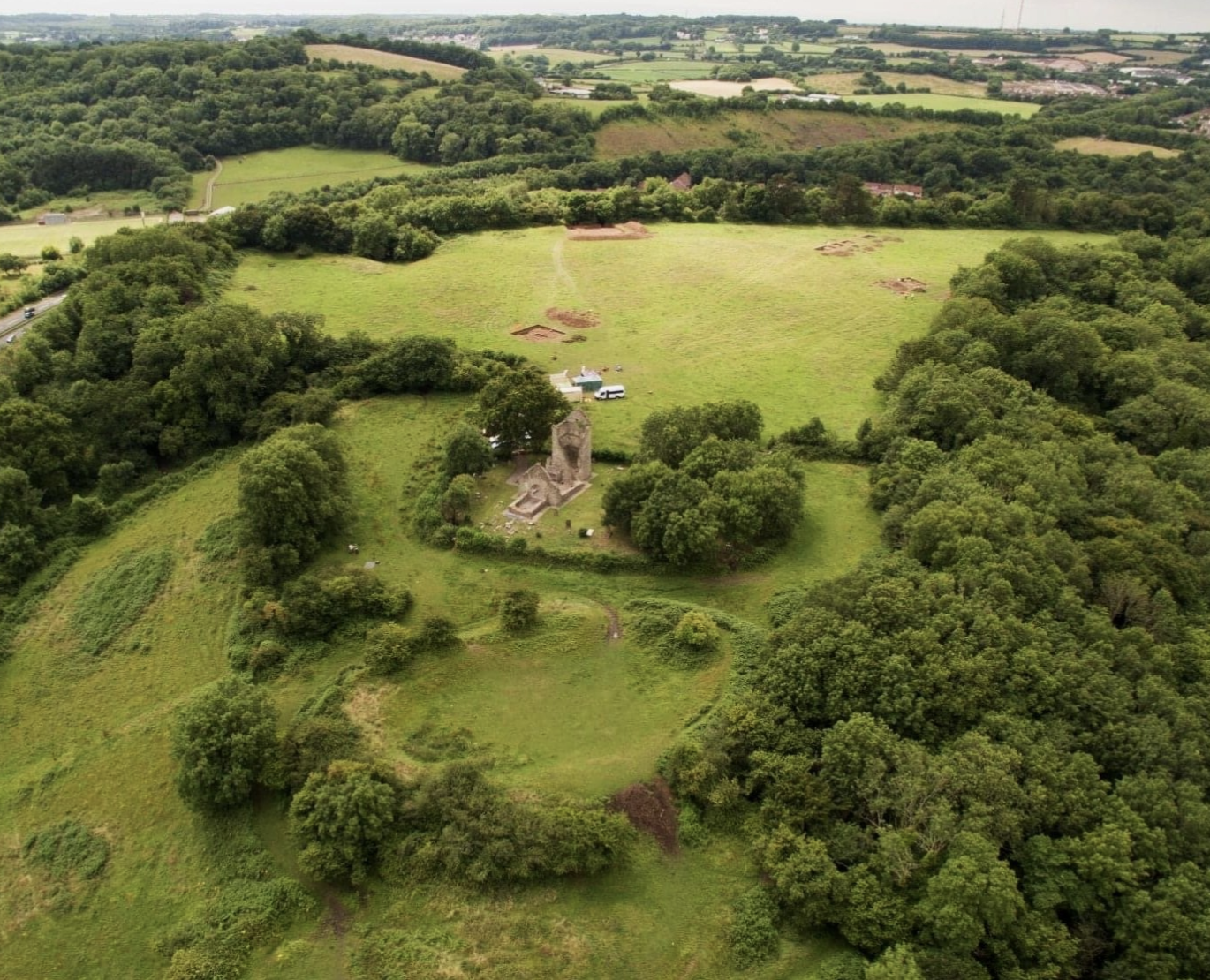Sustainability Case Studies
A Sustainability theme page
To achieve successful integration of ESD in your discipline or sessions, it can be useful to consider case studies and examples of good practice from Cardiff University and from around the world from which to take inspiration.
Case Studies
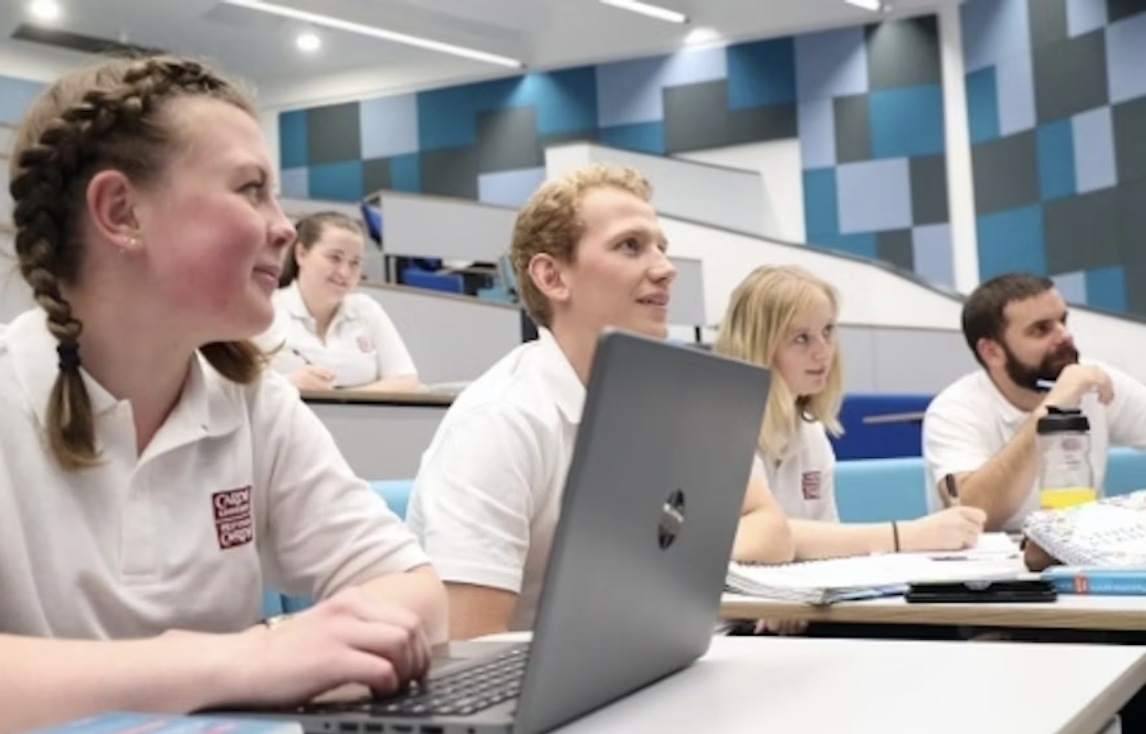
Content:
Using the UN Sustainable Development Goals as the vehicle, a series of lectures and resources is encouraging final year Physiotherapy students to explore how planetary health is inextricably linked to public health. The sessions cover issues such as personal responsibility and role modelling, the professional obligations to consider the environmental impact of clinical practice, and the environmental influences on public health on a local, national and global scale.
Delivery and Pedagogy:
Students are also encouraged to reflect on how they can act as advocates for patients/populations in terms of improving local environments, or access to sustainable means of living to widen accessibility and inclusivity of participation.
Assessment:
Their assessment for the course involves working in groups to develop a public health intervention and accompanying business plan, incorporating sustainability as a key focus.
Read more here.

Content:
As part of their course, students in our School of Computer Science and Informatics are given the opportunity to choose a topic related to a societal issue and explore a range of computing solutions to potentially address the issue. As climate change and sustainability are large concerns for many students, this module has attracted many proposals from students aimed at addressing these issues.
Delivery, Pedagogy and Assessment:
Projects have focused on topics including community tree planting, reporting wildfires in woodlands, increasing numbers of pollinators, reducing fly tipping, recycling school clothing and supporting foodbanks. Each of the solutions students propose are prototyped and tested utilising a user-centred design approach, focusing on the end users and their needs in each stage of the design process.
For students in computer science, it has always been a challenge to see the applications and impacts of software engineering in the real world. This module provides real-world, first-hand experience to students of how they can use their skills to tackle societal issues.
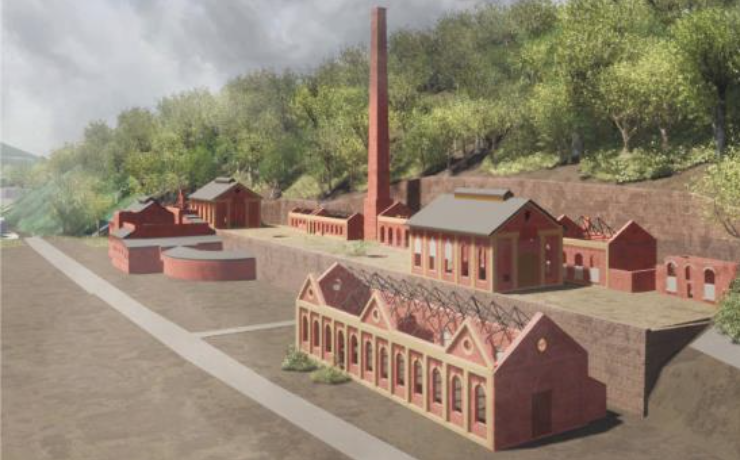
Content:
The 'Carbon Pasts, Low Carbon Futures' unit for year 5 Architecture students was created following student demand for a design unit looking at the themes of retrofit, adaptive reuse and sustainability. The unit brief calls on the students to make proposals for a sustainable future for industrial heritage sites, including uses that boost local employment. In 2021/22 this focused on Crumlin Navigation Colliery in the Ebbw valley and this year 2022/23 it looks at Cefn Coed Colliery in the Dulais Valley.
Delivery and Pedagogy:
Students are challenged to think of how these sites, partly responsible for the current climate emergency, can be catalysts for a low carbon future for the local and wider area, considering circular economy and renewable energy sources, including low enthalpy geothermal heat recovery. With the latter the students were assisted by the involvement of the head of the Coal Authority’s Head of Heat & By-Product Innovation.
Assessment:
The 2021/22 designs were exhibited at an exhibition on the site with the local community, politicians, policy makers and the wider public invited to view the proposals. The work of the unit as a whole was selected by the Welsh School of Architecture for submission for the RIBA President’s Medal. Read more about the project here.
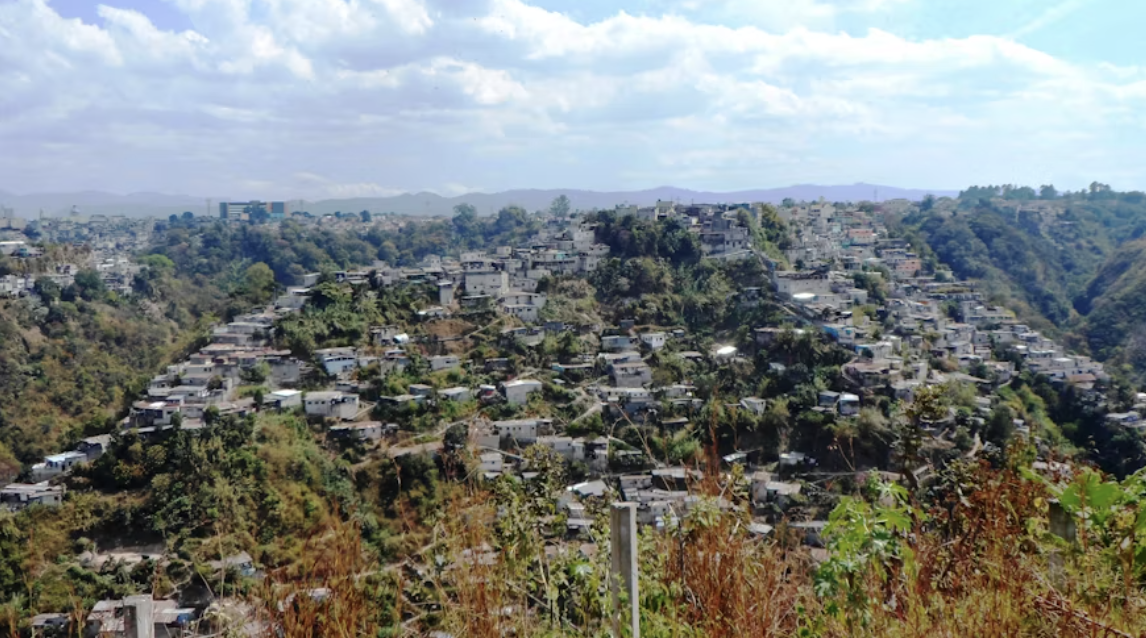
Content:
The 3rd year ‘Hazards, Risk, Resilience’ module was adapted in 2022-23 to create opportunities for students to explore links between sustainable development and disaster risk reduction. Recognising the prominence of themes such as resilience, adaptation, and disaster reduction across the SDGs (e.g., SDG 1.5, 2.4, 11.5, 13.1), the module examines the causes of disasters and different approaches to reducing disaster impacts.
Delivery and Pedagogy:
Content is delivered in lectures, supported by a range of workshops. The latter provide opportunities for students to develop core sustainability competencies (e.g., systems thinking, by exploring how different aspects of the natural and social environment interrelate to result in disasters; anticipatory thinking, by encouraging reflection on the consequences of a range of actions aiming to reduce disaster impacts).
Assessment:
Students have two assessments, both valuing authenticity and reflecting real-life activities in the discipline. They first prepare a policy brief, setting out why disasters are not natural, and then in groups they complete the necessary background research to design and present a poster on the hazards affecting a given city and potential mitigation options. Assessments require students to practice and demonstrate a range of sustainability competencies that have been introduced in class workshops.
Module taught by Joel Gill.

Content:
This module covers different ways in which our societies and their economic systems manage the natural environment, and the consequences for capitalist development of the relationship between business and nature. We offer a critical standpoint drawing on political economy, theories in sustainability studies and critical management studies, covering topics such as resource use, climate change, deforestation, environmental standards, the circular economy, and environmental crimes and disasters.
Delivery and Pedagogy:
The delivery is based on a flipped approach, where the learning materials are provided to students before class, and class time is dedicated to students’ engagement with the ideas covered through in-class activities, including case analyses. In this way, students critically appraise a variety of ways in which organizations attempt to manage nature and address interlocking sustainability crises.
Assessment:
All elements of assessment for this module address sustainability. Students’ critical engagement with the in-class activities is assessed through short written reflections on, for instance, the assumptions implicit in different approaches to particular sustainability challenges. Student groups also present to the class their analysis of particular empirical cases related to each of the five core sustainability approaches covered in the module. The final piece of assessment is an individual essay that demands detailed analysis of two of these core topics, drawing on empirical cases of the students’ choosing, emphasising the complexity of dealing with environmental issues.
Module taught by Marcus Gomes and Genevieve Shanahan.

Content:
The module explores the complex relationship between society and economy by delving into theories that explain how societal changes happen or are hindered. First semester students get an overview of capitalist societies and the social and environmental challenges of our time, shedding light on the governance relationships between civil society organisations, businesses and the state. The second semester focuses on empirical cases based on cutting-edge research within the Business School exploring how public value is created (or hindered). Climate change and other environmental issues and social movements features amongst the topics.
Delivery and Pedagogy:
An integral part of the module is the Public Value Leadership Academy (PVLA), in which students take their learning outside of the classroom and develop actions to tackle issues faced by the wider Cardiff community. The PVLA is co-designed and co-taught with Citizens Cymru Wales and fosters an environment in which the students learn leadership skills while developing an action to deepen their understanding of how change occurs and who can be impacted. In the 2022/23 academic year, students led actions focusing on carbon literacy in schools within Cardiff and better public transport for school children.
Assessment:
There are three assessment modalities. Throughout the year students must write five reflective posts – short texts using the mandatory readings to analyse specific contexts. Secondly, during the PVLA sections of semester 1, students develop their action campaigns and prepare a group presentation. From these pool of potential actions, some are selected and caried out during semester 2. The final piece of assessment is an individual reflection based on student engagement with the action developed.
Module taught by Marcus Gomes and Deborah Hann.

Content:
The module 'Environmental Histories' explores human-environment interaction over the past millennium.
Delivery and Pedagogy:
Designed for students with no prior knowledge, a flipped classroom approach was followed with lectures introducing themes and methods, followed by workshops where students apply them to case studies like the history of coal in Wales or the impact of the Little Ice Age.
Assessment:
Students analyse their own chosen sources and participate in group presentations. The module concludes with an in-class exhibition where students bring objects representing human impact on the environment, using them to explain the Anthropocene epoch.
Module taught by Professor Keir Waddington.
Read more about this module HERE.
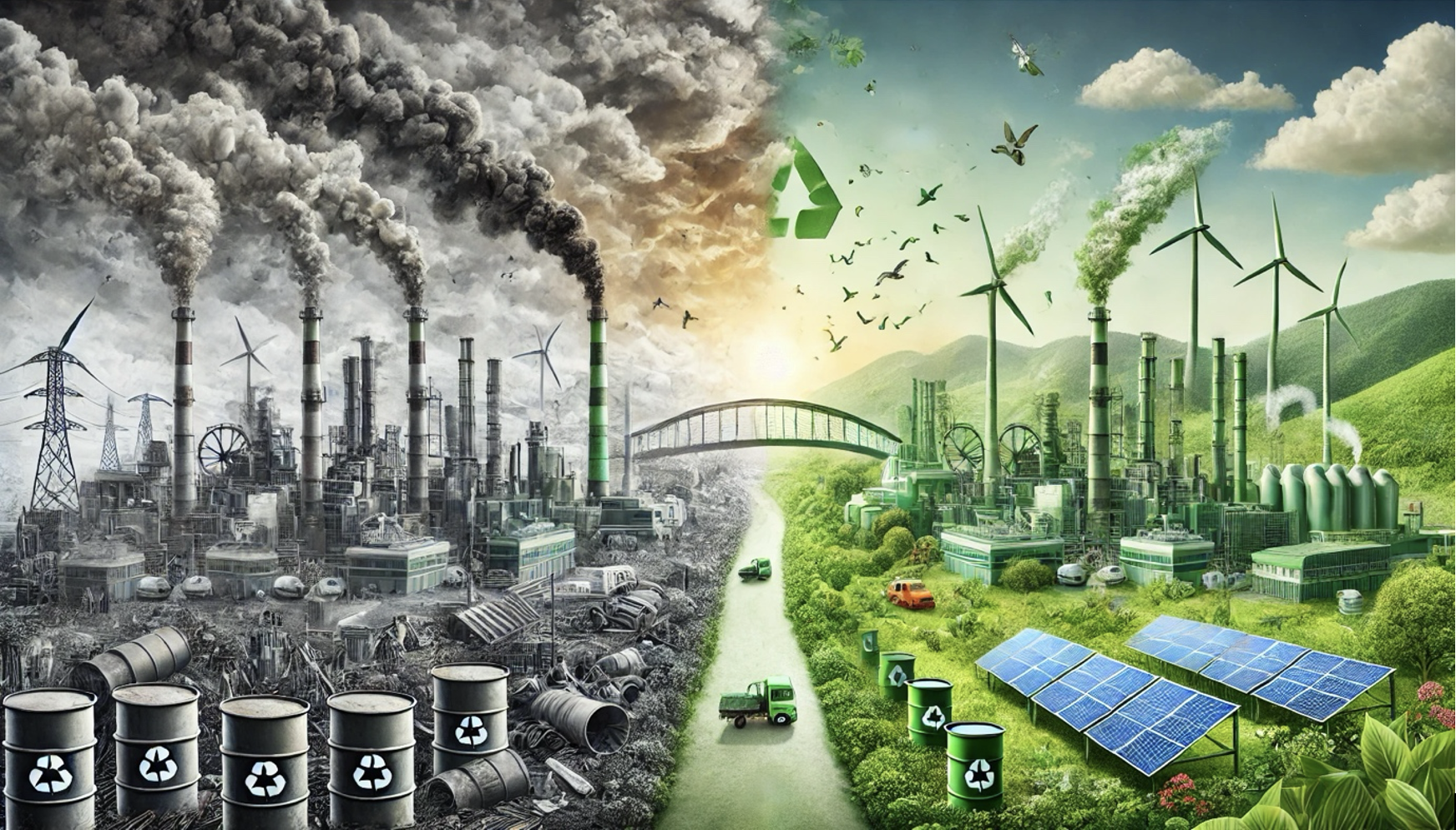
MSc in Chemistry for Sustainability
Content:
The MSc in Chemistry for Sustainability aims to equip students with the skills needed to address global sustainability challenges, using the UN SDGs as a framework.
The programme covers Sustainable Energy, Sustainable Materials, Sustainable Food, and Sustainable Health. Students will learn to identify and avoid greenwashing and engage in critical thinking.
Delivery and pedagogy:
Students will participate in mini-group projects and summer research projects, focusing on sustainability issues they are passionate about. They will conduct literature reviews and develop research plans with support from supervisors.
Industry and academic experts will deliver seminars on current trends and activities in sustainability.
A practical module will introduce students to sustainable chemistry practices.
The programme culminates in a hands-on research project in state-of-the-art facilities, with topics tailored to student interests, such as recyclable materials and low carbon energy generation.
Assessment:
Core material will be assessed through posters, oral presentations, written reports, and peer assessments. Practical skills will be continuously assessed, and optional modules will include exams and class tests.
Read more about the programme HERE.
Here is a video from Dr Carolyn Strong entitled ‘Marketing and Society – The story of public value teaching’
Sustainability, Employability and Entreprise: Partnerships in Education for Sustainable Development

Sustainable development challenges are increasingly important for businesses, with many addressing these issues at the Board level (Advance HE QAA 2021). There is rising demand for specialists in this field as companies aim to navigate and respond to environmental, social, and economic challenges. Furthermore, a growing trend involves start-up companies exclusively dedicated to sustainable development, emphasizing holistic, long-term solutions to complex problems.
Implications for Higher Education:
This shift highlights the importance of students developing Education for Sustainable Development (ESD) competencies and attributes. It requires enabling students to acquire ESD skills, knowledge, and values through authentic learning experiences, often facilitated by partnerships extending beyond the institution.
Cardiff University has established diverse partnerships, operating locally to globally (see below), providing students with varied ESD experiences within their disciplinary field.
ESD EARTH Partnership (SEP)
In a nutshell:
Who did you collaborate with?
The Severn Estuary
What did you do?
In this partnership students are given paid opportunities and placements for applied research. It allows students to have authentic experiential learning opportunities to apply and develop their skills and knowledge around a sustainable approach to planning, management and developing of the estuary.
What SDG does this align with?
SDG 15 (specifically 15.5).
Read more
The Severn Estuary Partnership (SEP) was set up in 1995 as an independent, evidence based, cross-border initiative, covering the Severn Estuary and inner Bristol Channel, hosted by Cardiff University, through the School of Earth and Environmental Sciences (EARTH). SEP delivers a wide-ranging programme of work, collaborating with stakeholders across the Severn Estuary, to promote a sustainable approach to the planning, management, and development of the estuary for all who live and work around the estuary, both now and for future generations.
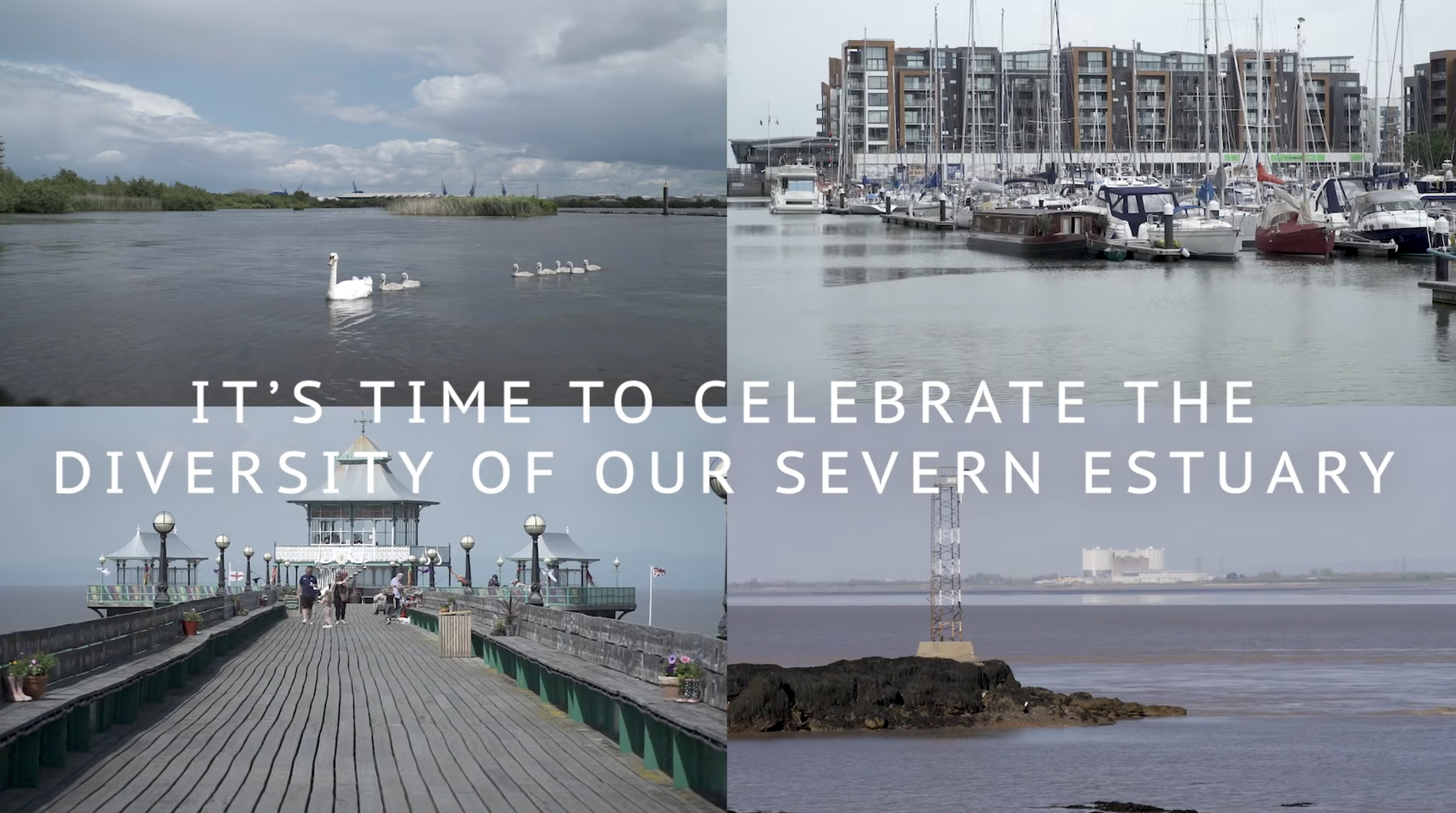
Both SEP and EARTH (including their student community) benefit from this 25-year partnership. SEP provides the School with unique opportunities for applied research, enhances the educational experience of students through training and opportunities for applied learning, and raises the profile of EARTH and Cardiff University as a national and international leader in multi-disciplinary, applied coastal research. EARTH provides SEP with office space, links to research expertise and access to university administrative assistance, most notably financial and human resource services, and other associated benefits to staff as employees of Cardiff University.
An excellent example of the positive nature of this partnership, and its contribution to education for sustainable development, is the creation and support by SEP of student internship and placement opportunities. This includes participation of SEP in the university’s on-campus internship programme and support of dedicated, paid placements. SEP provides opportunities for students from EARTH (and other schools) to work with them on projects supporting the sustainable planning, management, and development of the Severn Estuary for all who live and work here. SEP benefit from the research and analysis provided by students, who in turn benefit from the opportunity to acquire knowledge and skills that equip them to contribute to sustainable development (e.g., SDG 15.5, take urgent and significant action to reduce the degradation of natural habitats, halt the loss of biodiversity and, by 2020, protect and prevent the extinction of threatened species).
ESD SHARE Partnership (CAER)
In a nutshell:
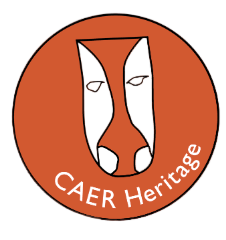
Who did you collaborate with?
CAER is a co-created partnership between Cardiff University and Action in Caerau and Ely (ACE).
What did you do?
This partnership works with the communities of Caerau and Ely to explore of the area's rich heritage through community-focused archaeological digs, historical co-research and co-created cultural activities that seek to open up opportunities and networks for local people and to address contemporary social and economic challenges. To date, the partnership has instigated significant infrastructural regeneration including a community heritage centre, playground and historical trails, as well as establishing a scholarship programme and a range of community development and widening participation initiatives.
What SDG does this align with?
SDG 8, 10 and 11 (but also engages with 1, 2, 3 4).
Read more
ESD CARBS Partnerships: Reflections from Lecturer Qian Li
What different partnerships do you currently collaborate in/with in Business? How do they support learning?
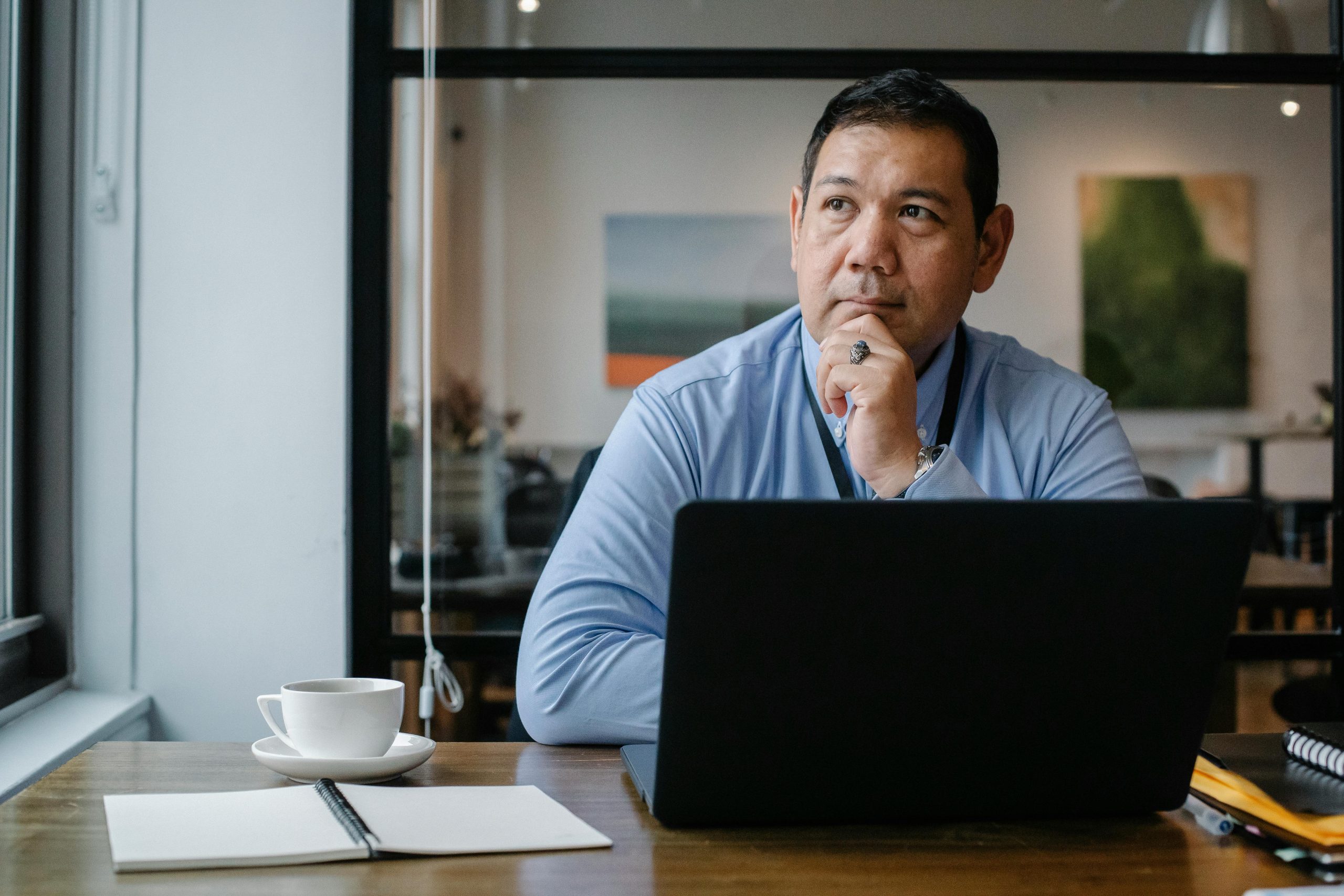
In my role at Cardiff Business School, I've engaged in strategic partnerships through the Public Value Engagement Fellowship in 2019 and 2023, aligning with modules BST821 Building Sustainable Supply Chains and BST806 Sustainability for Business. These fellowships focused on integrating business concepts with societal impact, significantly enhancing student immersion in sustainable development and public value. The feedback from alumni underscores the real-world applicability of the knowledge gained, demonstrating the value of these collaborations in enriching their professional journeys.
The 2019-2020 fellowship concentrated on reducing Scope 3 carbon emissions among Welsh SMEs. This project, in collaboration with the Federation of Small Businesses (FSB) Wales and the Carbon Disclosure Project (CDP), served as a dynamic learning platform. It involved students directly in developing carbon emissions reduction strategies for local businesses, thereby providing them with hands-on experience in sustainability practices and data analysis. This not only heightened their awareness of environmental issues but also prepared them for the challenges of sustainable business operations.
The 2023-2024 fellowship explores the "Net Zero Neighbourhoods in South Wales," in partnership with stakeholders such as WSP, FIBREE, ROOKWOOL, and UKGBC. This project offers students an invaluable opportunity to engage with industry leaders in sustainable urban development. My role in supervising students’ Cardiff On-Campus Internships Scheme on Research (CUROP) projects and live dissertation projects with business partners, further bridged the gap between academia and industry, contributing to the enhancement of our business school's placement programme. For example, I designed, led, and delivered a Live Project in collaboration with the industry partner DSV, resulting in a student winning the 2021 PARC Award and securing an internship opportunity. As a Board Member of the UK Green Building Council (GBC) Learning and Development Focus Group, I leverage these collaborations to enrich our curriculum and address the evolving needs of the industry. This role enables me to stay ahead of the latest developments and ensure that our educational content remains relevant and impactful, thereby preparing students to excel in a rapidly changing professional landscape focused on sustainability.
Can you discuss an example of partnerships you have undertaken with students? What was the partnership and what did it involve?
In a recent collaborative endeavour, I supported my PhD student Ran Zhang in the SustainaWHAT?! project. This initiative represents a pioneering collaborative effort aimed at engaging Postgraduate Research (PGR) students and Early Career Researchers across Cardiff, Newcastle, and Bournemouth Universities in the realm of sustainability and the United Nations’ Sustainable Development Goals (UN SDGs).
My partnership with Ran involved comprehensive mentorship and guidance in various aspects of the project. We engaged in in-depth discussions on interview preparation, selected compelling case studies for the events, and strategised on effectively promoting these events. A testament to the success of this collaboration is our joint working paper titled “Synergies between social and corporate governance precedence and sustainable development goals: A pathway to corporate-led change,” which we presented at the British Academy of Management 2023 conference.
SustainaWHAT?! stands out as a cross-faculty and cross-institutional project, uniquely designed to delve into the connections between the UN SDGs and various academic disciplines. It fosters a dynamic environment where multidisciplinary teams of PGRs and staff lead and facilitate discussions and activities. This project not only afforded Ran and other students the chance to enhance their research and professional skills but also provided a valuable platform for networking and interdisciplinary collaboration.
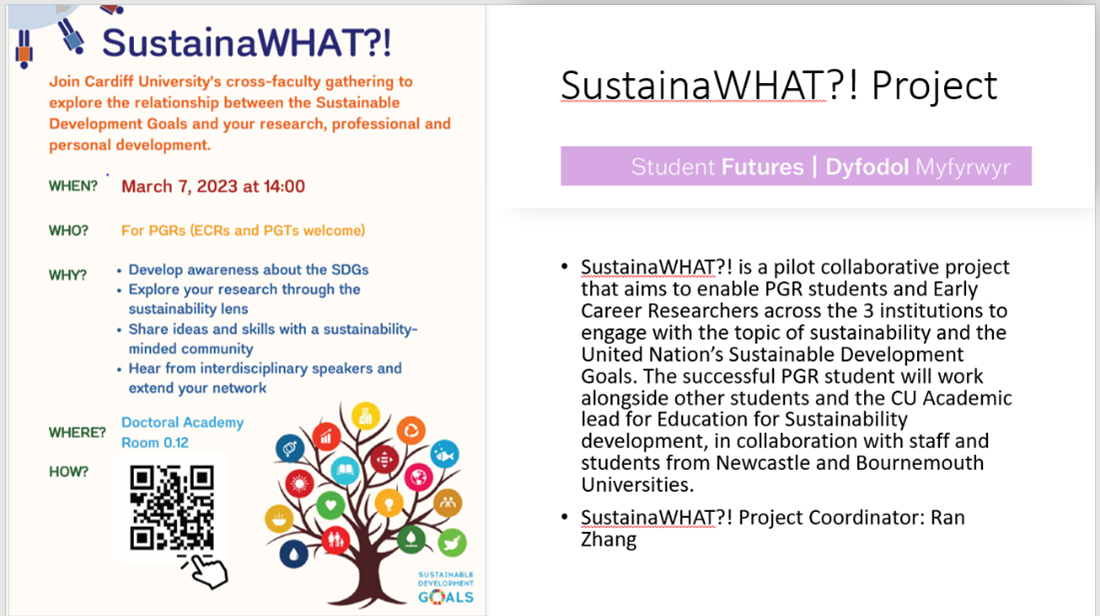
How did it work out – was it successful? How do you know?
The initiative was particularly successful in its aim to foster awareness among PGR students (also Postgraduate Taught students) about the SDGs and their implications for academic research. Participants were encouraged to view their research through a sustainability lens, which facilitated the sharing of ideas and skills with other sustainability-focused researchers. This exposure to interdisciplinary speakers from both academia and industry practitioners enriched the learning experience significantly.
What did the student and you think of it?
Ran and I viewed this project as an immensely rewarding experience. It allowed for meaningful academic engagement, broadened our perspectives on sustainability, and enhanced our professional development. The success of the project is evident in the quality of research outputs, the depth of discussions it fostered, and the positive feedback received from participating students and colleagues.
Further examples of ESD across different disciplines from other universities
Education for the Sustainable Development Goals at DMU
De Montfort University have a range of discipline specific case studies that can support examples of ESD in teaching practice.
ESD in Curriculum and Pedagogy at UWE
UWE Bristol have some great examples of how different disciplines have developed ESD in their learning and teaching and also, through their research.
Bournemouth University education for sustainable development case studies
Bournemouth University run two internal teaching awards to celebrate ESD embedded in the curriculum.
Deeper Dive
Share your feedback
Where next?
You're on page 4 of 4 Sustainability theme pages. Explore the others here:
What Do We Mean By Sustainability?
Or how about another theme?
